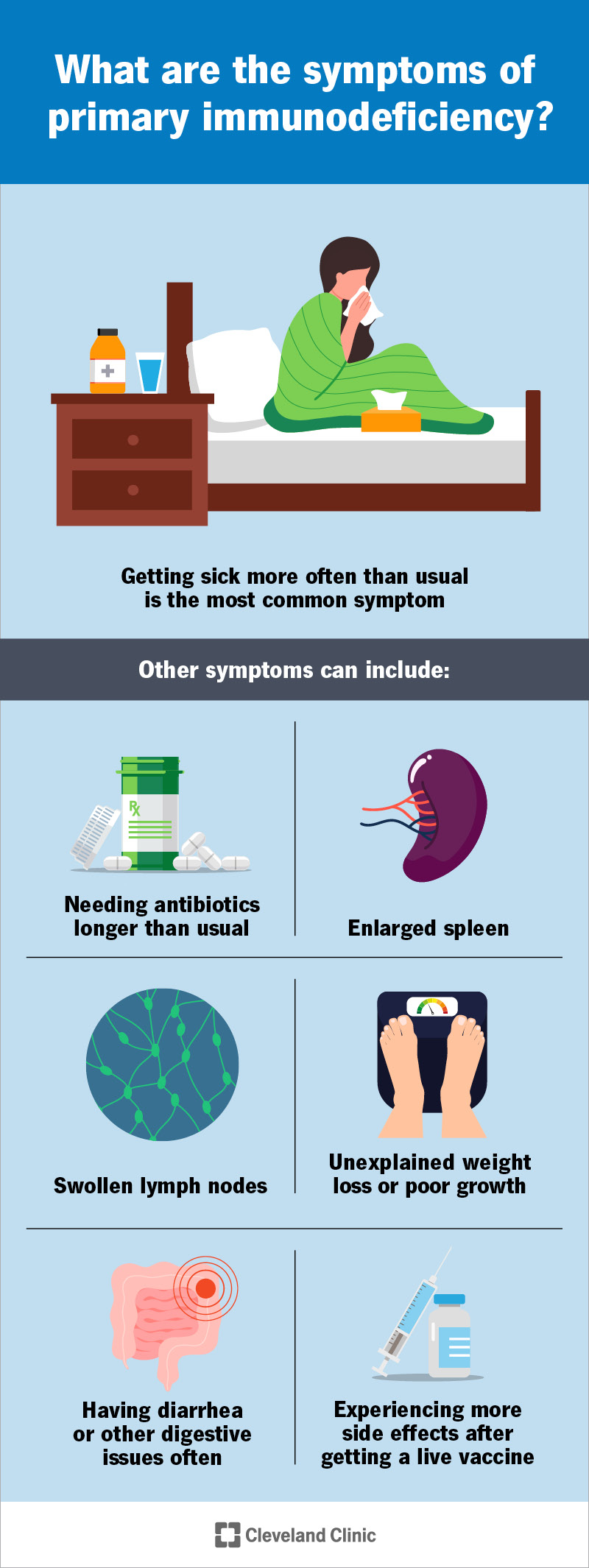Primary immunodeficiency diseases (PIDD) weaken your immune system. There are hundreds of types. They range from mild to life-threatening. But all of them increase your risk of getting sick. Your healthcare provider will suggest ways to help you avoid infections and dangerous complications.
Advertisement
Cleveland Clinic is a non-profit academic medical center. Advertising on our site helps support our mission. We do not endorse non-Cleveland Clinic products or services. Policy
Video content: This video is available to watch online.
View video online (https://cdnapisec.kaltura.com/p/2207941/sp/220794100/playManifest/entryId/1_sp7bxdkh/flavorId/1_5f3sgelj/format/url/protocol/https/a.mp4)
Living with primary immunodeficiency can impact your mental health, so it's important to seek support, share your diagnosis and practice self-compassion.
Primary immunodeficiency diseases (PIDD) are conditions that affect your immune system. If you have a PIDD, parts of your immune system don’t work as they should.
Advertisement
Cleveland Clinic is a non-profit academic medical center. Advertising on our site helps support our mission. We do not endorse non-Cleveland Clinic products or services. Policy
If you have a primary immunodeficiency, you’ll get sick more often than most people. That’s because your immune system doesn’t have all the tools it needs to fight off germs and other invaders that may cause infections. You may live with a compromised immune system. This will increase your risk of complications, even from common infections that are usually minor.
There are more than 400 types of primary immunodeficiencies. Some cause symptoms as soon as you’re born. Others may not affect you until you’re an adult.
They range from mild to severe. Mild types may only cause minor symptoms. Severe PIDD can cause fatal complications.
Some primary immunodeficiency diseases include:
Secondary immunodeficiency is when a health condition or a medication factor causes immunodeficiency. It’s a different issue, but it can cause similar symptoms.
Lots of conditions can cause it, including:
Advertisement
Medications that can weaken your immune system include:

Image content: This image is available to view online.
View image online (https://my.clevelandclinic.org/-/scassets/images/org/health/articles/primary-immunodeficiency-infographic)
Getting sick more often than usual is the most common symptom. You might catch infections more easily than people around you. And when you do get sick, you may experience more severe symptoms or complications.
You might notice that it takes you longer to recover from an illness than others. Infections may go away and come back, even after you start a treatment.
Other symptoms can include:
Most people with a PIDD experience symptoms before turning 20. But they can develop at any point in life.
Genetic changes cause primary immunodeficiencies. They prevent your immune system from developing and working correctly. It might be:
You can’t control the genetic changes — they happen before you’re born. Which genes are changed will determine the disorder you develop.
The changes that cause primary immunodeficiencies often run in biological families. That means if your biological parents or siblings have a PIDD, you may be more likely to have one, too.
These disorders are more common in males.
A healthcare provider will diagnose a PIDD based on a few factors:
Your provider will probably use a few tests, including:
Every state in the U.S. tests babies for severe combined immunodeficiency (SCID) when they’re born. That’s because SCID is fatal if it’s not treated right away.
Your healthcare provider will suggest ways to manage and prevent infections. The treatment you’ll need depends on which PIDD you have.
You might need:
Visit a healthcare provider if you feel like you get sick too often. Everyone gets sick every once in a while. But you know your body better than anyone. You can tell when something doesn’t feel right.
Advertisement
Talk to your provider if you’ve started treatment for a PIDD and it feels like your medications aren’t working. Tell them if you have a fever or infection. They’ll suggest ways to avoid complications.
You’ll have to monitor your body for signs and symptoms of infections. And you may need to take medications for the rest of your life. Your healthcare provider will help you understand the best ways to avoid infections, including:
Your loved ones can help you stay safe and healthy, too. Ask them to let you know if they’re sick, feel unwell or have had an infection recently. This can help them avoid accidentally spreading infections when they see you in person.
Living with a primary immunodeficiency (PIDD) can feel like a lot of work. But you don’t have to do it alone. Your healthcare provider and loved ones can help. Your provider can suggest treatments. They can also recommend a support group if you’re interested in talking to other people with similar experiences. Your friends and family can help you avoid infections and plan safer social gatherings. Remember, having a condition like a PIDD is just a part of your health; it doesn’t define who you are. Only you can do that.
Advertisement
Learn more about the Health Library and our editorial process.
Cleveland Clinic's health articles are based on evidence-backed information and review by medical professionals to ensure accuracy, reliability, and up-to-date clinical standards.
Cleveland Clinic's health articles are based on evidence-backed information and review by medical professionals to ensure accuracy, reliability, and up-to-date clinical standards.
Cleveland Clinic’s primary care providers offer lifelong medical care. From sinus infections and high blood pressure to preventive screening, we’re here for you.
